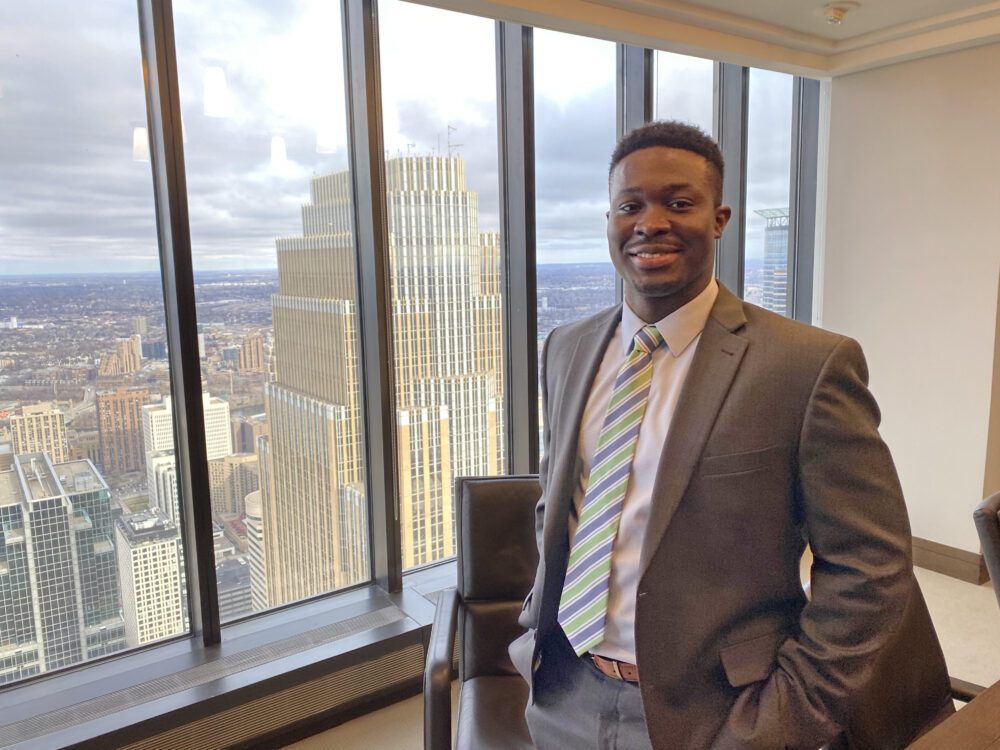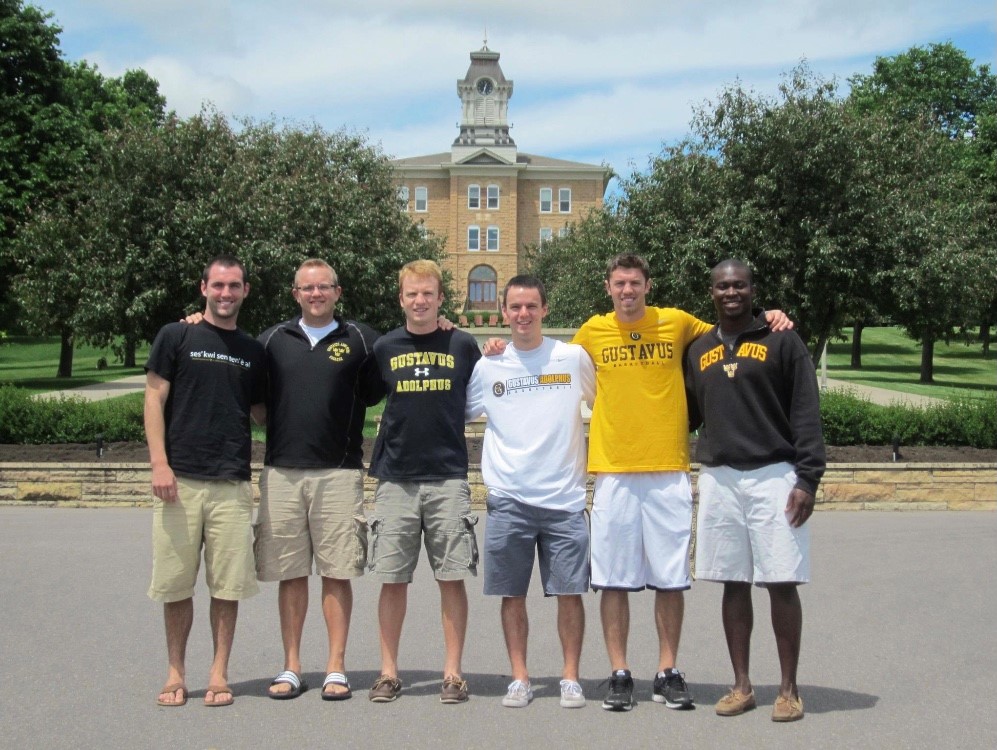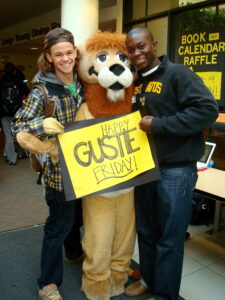Kojo Addo '12 exemplifies what it means to persevere through hardships and find motivation to keep moving forward. His success story and continuing journey are so inspiring to us, both as athletes and as students going through college!

Kojo Addo '12
by Dana Melius
Kojo Addo ’12 recalls a rough first semester at Gustavus Adolphus College in the fall of 2008. He failed one class, barely managed through a second course, and then hit academic probation.
“My first year at Gustavus is perhaps the most defining period of my academic and professional journey,” Addo says. “I failed Chemistry, barely passed World Geography. I hit a low. I was ready to transfer out and re-evaluate my future.”
But people around Addo encouraged the Wayzata High School graduate to hang in there. And he credits Gustavus’s intimate academic environment, its counselors, and his family and friends for pointing him in the right direction.
“My family, Gustavus friends, Virgil Jones, and on-campus counselors encouraged me not to give up on myself and persevere through the failure.”
Addo’s parents are Ghanaian immigrants, and Kojo reflected on that journey, rallied around solid encouragement and support, and moved forward with a renewed vision of what might be.
“There is an old Ghanaian adage that translates to ‘persistence guarantees success.’ I actually incorporated that into my Gustavus personal statement when I applied. That is exactly what I did.”
The fact that Addo even applied to Gustavus was surprising, he recalls.
“When it came time to tour colleges, I envisioned myself attending a large Midwest university,” Addo says. “A small private school in southern Minnesota was not on my radar.”
On top of that, Addo said he “visited on a gray, slushy, spring day in March”—not the perfect setting to attract a prospective freshman.
“But the moment I stepped foot on the campus, I felt at home. I saw myself walking around, eating at the Caf, and being a part of the Gustavus community.”
After that tough first semester, spring classes “clicked with me,” Addo says. He especially enjoyed Introduction to Sociology and Political and Legal Thinking. Friends, too, connected with Addo.
“This is exactly where I needed to be,” Addo recalls thinking. “I needed to be a part of this community. I felt connected. That’s what I needed at that point in my life.”
A change of direction
Addo’s sophomore year at Gustavus helped reveal that new direction as he dropped thoughts of being a doctor and instead chose to be a communication studies major and management minor.
“I recognized that my skills were geared towards advocacy and consensus building. I will forever be grateful to Professor Leila Brammer, Professor Patricia English, and the rest of the communication studies faculty for their commitment to inspiring students…They had a very significant impact on me.”
As Addo’s Gustavus academic career flourished, he cites others who continued to make significant contributions to his growth. His good friend, Matthew Wasson, joined him as an intern in then-President Jack Ohle’s office. Barb Larson Taylor, then assistant to the president, was their supervisor.
“She is gold, an amazing woman,” Addo says.
Wasson, a Duluth native now living in St. Louis Park, was one Gustie who became close friends early on with Addo.
“We became friends the first week of college,” Wasson said. “We’ve been close friends ever since…He’s just one of those people that you meet that you’ll never forget.”
Addo’s final semester at Gustavus brought him into Securian Financial as an assistant analyst, with mentor Gary Christensen, general counsel of the company.
“Gary and I had many conversations about the doors that a legal education would open for me,” Addo says. “My conversations with Gary and my uncle, Fred Adiya (also a lawyer), played a large part in what motivated me to apply to law school.”
Addo attended William Mitchell College of Law, later becoming the Mitchell Hamline School of Law. After year one there, Addo clerked in 2015 for the Schwebel, Goetz & Sieben law firm in Minneapolis. The firm’s emphasis on personal injury cases drew him into the field.
“At the end of that summer, I knew very clearly what area of law I wanted to practice, the clients I wanted to help, and the people I wanted to work with.”
Addo joined the firm as an attorney in October 2017. James Ballentine became one law firm mentor.
“Kojo is one of the best-liked lawyers in our law firm,” Ballentine said. “The support staff loves him. He’s kind. He’s a gentle soul. He’s just a joy to work with.”
But in the legal world, it’s the client who counts most, and that’s where Addo truly excels, according to Ballentine.
“He’s got a good sense of what his clients want and need,” Ballentine said. “He’s a wonderful attorney. He’s a great advocate for his clients… And he’s fearless.”

Kojo Addo (right) with Gustavus friends and classmates Matthew Wasson, Steve Dow, Dan Brockberg, Doug Frey, and Tyler Grey (l to r).
Advocacy on current issues
Addo’s parents were Ghanaian immigrants, settling in Newark, New Jersey in the 1980s. His family roots in Ghana were more upper-middle class by “African standards,” Addo says.
“A lot of Ghananian immigrants arrived there and found success there.”
So when immigration became a hot topic on the political front over the past few years, Addo says it affected him. And it helped reignite his passion for advocacy.
“It’s been difficult,” Addo says, seeing immigration become such a controversial issue. “I count myself really lucky (as a first-generation United States citizen). I’m a part of that story. I’m a product of immigrants.”
But it wasn’t easy for his parents as they began their U.S. way of life. They struggled to find safe, suitable daycare options. Because of that, Addo was sent back to Ghana and cared for by his grandmother for three years.
“It’s like the best of both worlds. It makes me stronger in a way. This is who I am and I’m better for it. Nothing can shake you. That land (Africa) flows through me.”
But the George Floyd killing prompted even deeper emotions for Addo. It shook him.
“This is something that shakes the whole country, the whole world to its core. Seeing it happen in broad daylight, on Memorial Day, was really heartbreaking.”
Addo’s growing advocacy on the issues of race had previously rose with the February 23, 2020, killing of 25-year-old Ahmaud Arbery, who was chased down and shot while jogging.
After both incidents, Addo said he emailed his legal colleagues and expressed his anger and emotions despite being relatively new to the firm and the lone Black attorney on staff. And his colleagues responded.
“The outpouring of support was really high and I felt so good about that,” Addo says, and he began to lead and join vigils calling for change.
“We all have histories. We’re all George…George Floyd has made me do things I didn’t think I’d be doing…We need to continue the conversation.”

No comments:
Post a Comment